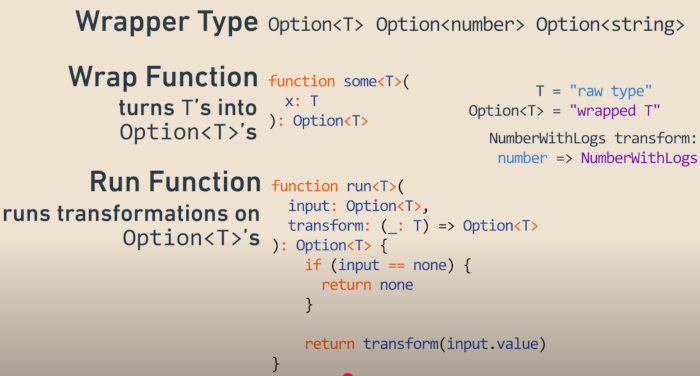Monads: Difference between revisions
Jump to navigation
Jump to search
Created page with "=Introduction= Heard about this with a friend and never really revisited it. With my attention at home on Rust, thought I might write something down =The Maybe Monad= Well possibly the Option monad for me. To make one of these you need <syntaxhighlight lang="hs"> return :: a => Maybe a >>= : Maybe a </syntaxhighlight> =What's the Point= *Same idea works for other effects *Supports pure programming with effects *Use of effects explicit in types *Functions that work for..." |
|||
| (2 intermediate revisions by the same user not shown) | |||
| Line 2: | Line 2: | ||
Heard about this with a friend and never really revisited it. With my attention at home on Rust, thought I might write something down | Heard about this with a friend and never really revisited it. With my attention at home on Rust, thought I might write something down | ||
=The Maybe Monad= | =The Maybe Monad= | ||
Well possibly the Option monad for me. To make one of these you need | Well possibly the Option monad for me. To make one of these you need define something to wrap your thing with and a function which could fail that returns the wrapper type | ||
<syntaxhighlight lang="hs"> | <syntaxhighlight lang="hs"> | ||
return :: a => Maybe a | return :: a => Maybe a | ||
>>= : Maybe a | >>= :: Maybe a | ||
</syntaxhighlight> | </syntaxhighlight> | ||
This was explained to me a little better with this picture.<br> | |||
[[File:Monads.png|700px]]<br> | |||
=What's the Point= | =What's the Point= | ||
*Same idea works for other effects | *Same idea works for other effects, e.g. reading from environments, input/output | ||
*Supports pure programming with effects | *Supports pure programming with effects | ||
*Use of effects explicit in types | *Use of effects explicit in types | ||
*Functions that work for any effect | *Functions that work for any effect | ||
Latest revision as of 04:25, 10 February 2025
Introduction
Heard about this with a friend and never really revisited it. With my attention at home on Rust, thought I might write something down
The Maybe Monad
Well possibly the Option monad for me. To make one of these you need define something to wrap your thing with and a function which could fail that returns the wrapper type
return :: a => Maybe a
>>= :: Maybe a
This was explained to me a little better with this picture.

What's the Point
- Same idea works for other effects, e.g. reading from environments, input/output
- Supports pure programming with effects
- Use of effects explicit in types
- Functions that work for any effect